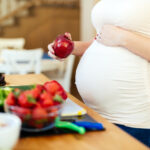by: October 24, 2024
 (NaturalHealth365) Environmental toxins can harm fetal health during pregnancy. Common sources include consumer product chemicals, alcohol, tobacco, and heavy metals – all of which increase miscarriage risk. Currently, about 10-15% of known pregnancies end in miscarriage before 20 weeks.
(NaturalHealth365) Environmental toxins can harm fetal health during pregnancy. Common sources include consumer product chemicals, alcohol, tobacco, and heavy metals – all of which increase miscarriage risk. Currently, about 10-15% of known pregnancies end in miscarriage before 20 weeks.
Research highlights specific risks. A recent study in Ecotoxicology and Environmental Safety found that pesticide exposure significantly increases miscarriage. These substances can damage both maternal and fetal tissue, leading to pregnancy loss.
This matters because many of these exposures are common in everyday life, from household products to workplace environments. While some exposure may be unavoidable, understanding these risks helps healthcare providers and pregnant women make informed decisions about reducing harmful environmental contact during pregnancy.
New research shows pesticide exposure significantly increases pregnancy loss risk
The above-referenced research found pregnant women exposed to pesticides face a 41% higher risk of spontaneous abortion compared to those with minimal or no exposure. Organophosphate pesticides were the most common exposure type, though the study examined various pesticide classes.
The comprehensive review, analyzing data from 18 studies across the United States and Italy, included 439,097 pregnant women aged 16 and older.
Explaining the “why” of a higher miscarriage rate when exposed to pesticides
Though scientists and researchers are not completely certain as to why exposure to pesticides contributes to miscarriage, they have some ideas. It is believed that contact with pesticide chemicals causes oxidative stress, inflammation, and even endocrine function disruption.
Scientists insist pesticides are especially threatening to fetuses as their bodies are small, vulnerable, and highly sensitive while developing in the womb. The harmful chemicals within pesticides are capable of crossing the placenta that connects the fetus to the mother’s uterine wall. It is during and after this chemical crossover period that the developing fetus is harmed. The harm involves differentiation, cellular division, and developmental problems.
It is also interesting to note that pregnant women who come into contact with pesticides are more likely to experience other problems in addition to miscarriage. Pesticide exposure also increases the chances of a lower birth rate, preterm/post-term delivery, and congenital problems.
Protect your pregnancy by avoiding environmental toxins
Environmental toxins can significantly impact pregnancy outcomes. Understanding and minimizing exposure to these substances helps protect both the mother and the developing baby.
Pesticides pose one of the most serious risks during pregnancy. Choose organic produce when possible, especially for foods known to have high pesticide residues. Thoroughly wash fruits and vegetables and remove the outer leaves of leafy greens. Stay away from recently treated gardens, lawns, or agricultural areas.
Heavy metals pose risks in everyday items. Lead exists in older homes’ paint and pipes, mercury in large fish, and arsenic in some well water. During pregnancy, test older homes for lead, limit tuna and swordfish consumption, and consider water filtering if using well water.
Household solvents deserve careful attention. Avoid or limit exposure to paint thinners, nail polish products, and harsh cleaning supplies. Choose natural cleaning alternatives and ensure good ventilation when cleaning. Let others handle painting projects or car maintenance involving chemicals.
Endocrine disruptors appear in many modern products. Minimize exposure by avoiding plastic food containers, checking canned goods for BPA-free linings, and being selective about personal care products. Use glass or stainless steel containers for food storage, and never microwave food in plastic.
For radiation exposure, inform healthcare providers about your pregnancy before any imaging procedures. In addition, at those airport scanners, you may want to avoid these devices by requesting a pat-downs instead. Plus, minimize your use of wireless devices, especially cell and cordless phones.
Creating a safer environment doesn’t require perfection. Focus on changes you can control: switching to natural cleaning products, washing produce thoroughly, ensuring good ventilation, and storing food in glass containers. Discuss specific concerns about your home or workplace with your holistic healthcare provider or health coach for personalized guidance.
Sources for this article include:
No hay comentarios:
Publicar un comentario